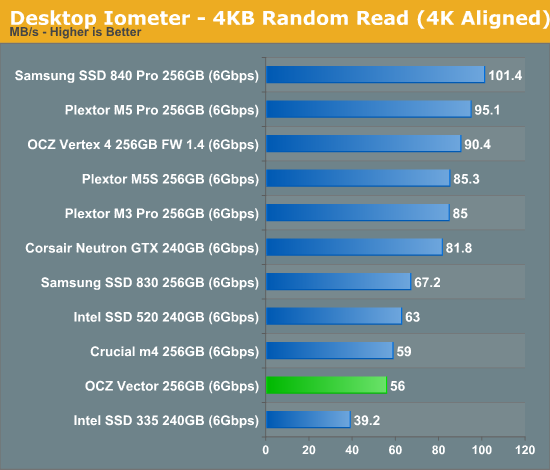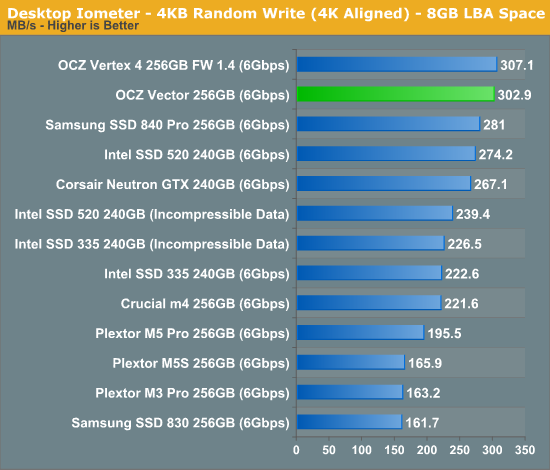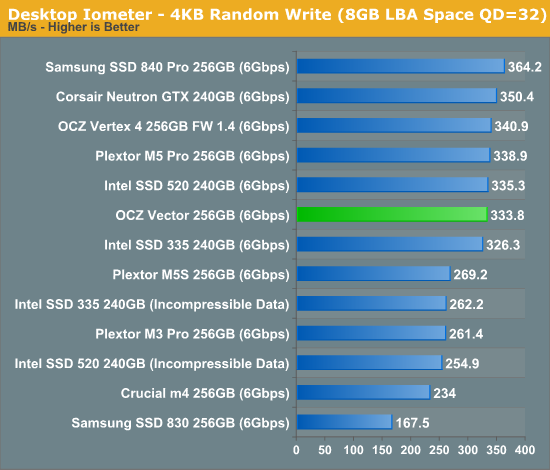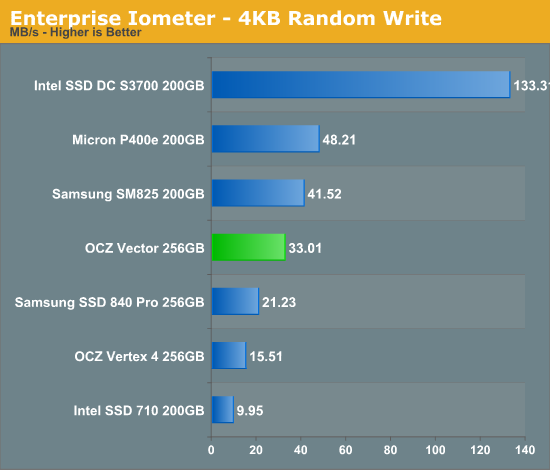OCZ Vector (256GB) Review
by Anand Lal Shimpi on November 27, 2012 9:10 PM ESTRandom Read/Write Speed
The four corners of SSD performance are as follows: random read, random write, sequential read and sequential write speed. Random accesses are generally small in size, while sequential accesses tend to be larger and thus we have the four Iometer tests we use in all of our reviews.
Our first test writes 4KB in a completely random pattern over an 8GB space of the drive to simulate the sort of random access that you'd see on an OS drive (even this is more stressful than a normal desktop user would see). I perform three concurrent IOs and run the test for 3 minutes. The results reported are in average MB/s over the entire time. We use both standard pseudo randomly generated data for each write as well as fully random data to show you both the maximum and minimum performance offered by SandForce based drives in these tests. The average performance of SF drives will likely be somewhere in between the two values for each drive you see in the graphs. For an understanding of why this matters, read our original SandForce article.

Low queue depth random read performance sees a significant regression compared to the Vertex 4. OCZ derives the Vector's specs at a queue depth of 32, at which it'll push 373MB/s of 4KB random reads. As Intel has established in the past, low queue depth random read performance of around 40 - 50MB/s is sufficient for most client workloads as we'll soon see in our trace based storage bench suite.

Low queue depth random write performance is a very different story, here the Vector pretty much equals the Vertex 4's already excellent score.
Many of you have asked for random write performance at higher queue depths. What I have below is our 4KB random write test performed at a queue depth of 32 instead of 3. While the vast majority of desktop usage models experience queue depths of 0 - 5, higher depths are possible in heavy I/O (and multi-user) workloads:

Crank up the queue depth and the Vector does well, but Samsung's SSD 840 Pro manages a nearly 10% performance advantage here.
Steady State 4KB Random Write Performance
OCZ will surely derive enterprise versions of the Vector and its Barefoot 3 controller, but I was curious to see what steady state 4KB random write performance looked like on the drive. I grabbed some of our Enterprise Iometer results from the S3700 review and trimmed out the non-SATA drives. The results are hugely improved compared to the Vertex 4:

Keep in mind this isn't an enterprise drive, and thus it's not too surprising to see significantly higher numbers here from other enterprise drives but the improvement over the Vertex 4 is substantial. Note that Samsung's SSD 840 Pro lands somewhere in between the Vector and Vertex 4.










151 Comments
View All Comments
SodaAnt - Wednesday, November 28, 2012 - link
Its way too large for a msata drive, so it wouldn't fit anyways.somebody997 - Thursday, April 11, 2013 - link
Why is there an mSATA connector on the PCB anyway?somebody997 - Thursday, April 11, 2013 - link
The PCB is far too large for an mSATA drive anyway, so why have the mSATA connector?Anand Lal Shimpi - Wednesday, November 28, 2012 - link
That's likely a custom debug port, not mSATA.Take care,
Anand
Heavensrevenge - Wednesday, November 28, 2012 - link
Actually that connection is indeed a physically identically sized/compatible m-SATA connection. The problem is it's inability to actually plug in due to the SSD's general size or whether it's able to communicate with the typical m-SATA ports on mobos.http://www.pclaunches.com/entry_images/1210/22/tra... should give a decent example.
vanwazltoff - Thursday, December 20, 2012 - link
might be a sign of something else in the works from ocz like an msata cable to plug into it or something, maybe something even more awesome like double the band width by connected it to a ocz pci break off board. i guess we will seemayankleoboy1 - Tuesday, November 27, 2012 - link
I have a Vertex2 256GB SSD.Is it worth upgrading to a Vector or a Samsung840 Pro SSD ?
MadMan007 - Tuesday, November 27, 2012 - link
If you've got a motherboard with SATA 6Gb/s you would probably notice a difference. Whether it's worth it is up to you - do you do a lot of disk-intensive work to the point where you wish it were faster? While I'm the difference would be noticable, it might not be huge or worth spending $200+ on.MrSpadge - Wednesday, November 28, 2012 - link
Are you often waiting for your disk to finish tasks? If not it's not going to be worth it.Beenthere - Tuesday, November 27, 2012 - link
It's going to take more than a nice type written letter to resolve the many product and service issues at OCZ - if they stay in business over the next six to 12 months.FYI- A five year warranty ain't worth the paper it's written on if the company no longer exists. In addition a five year warranty does not mean that a particular product is any better than a product with a one year warranty. For each extended year of warranty, the product price increases. So you're paying for something you may or may not ever use.
In addition it's useful to read the fine print on warranties. Most state that you will receive a refurbished or reconditioned replacement if your product develops a defect. If you've ever seen some of the "reconditioned" or "refurbished" mobos from Asus or similar products from other companies, you'd never install them in your PC.
People reach many untrue conclusions about product quality based on the warranty.